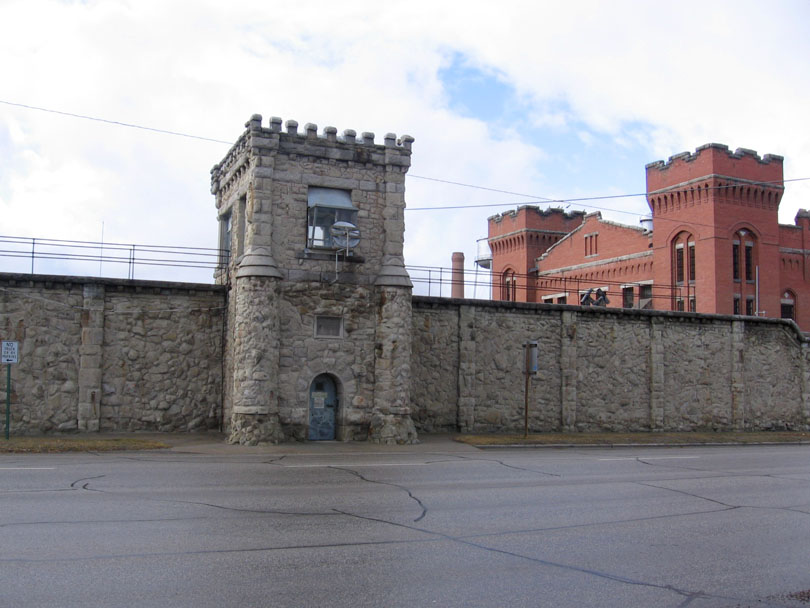Back around the close of the 1970s, my friend next door showed me a newspaper article that seemed to be about my father. It was about a Bahá’í chiropractor—a Dr. Jensen—who was making prophecies about a coming calamity. My father, Dr. John Jensen, is a Bahá’í chiropractor with a Bahá’í fondness for doomsday visions. Fortunately—or unfortunately, as the case may be—the Dr. Jensen featured in the article was out in Montana, a long way from my home in central California. It was some other Bahá’í chiropractor named Jensen.

The old Montana State Prison in Deer Lodge, Montana
This was quite a coincidence, of course. It’s not like there are many Scandinavian Bahá’ís like there are hoards of Scandinavian Mormons.
Actually, my father’s dad was one of those Scandinavian Mormons, but that’s another story.
One thing the Bahá’ís and Mormons do share, though, is a peppering of heretics across the Rocky Mountain states. Must be something about mountains that brings out the heretic in people.
This Dr. Leland Jensen of Missoula, Montana was well known among researchers for his string of failed prophecies. He was also known for being convicted for sexually molesting of a minor. It was while doing time in the big house that Jensen received his calling, as so oft it happens. Upon release, Jensen founded his own Bahá’í sect, and commenced to doing what prophets do.
My father was and is quite different. He is a principled man who would never entertain prophetic delusions or manipulate people as the Montana Jensen did.
But my father did—and does—share Leland Jensen’s apocalyptic view of the immediate future. He is a Bahá’í, after all. It’s in the scripture. A lot of bad things are going to have to happen for the world to be cleansed before the last century ends.
As a child in a Bahá’í household, I learned about a horrible calamity that would soon cleanse the world of its blind materialism and render it receptive to the light of faith in Bahá’u’lláh. We weren’t sure what exactly would happen but we knew it would necessarily be bad—something along the lines of Zechariah 13:
In the whole land, declares the LORD,
two-thirds will be struck down and perish;
yet one-third will be left in it.
This third I will bring into the fire;
I will refine them like silver
and test them like gold.
Two-thirds of the people of the world would perish, and many of the survivors might wish they had perished as well. It was a retributive promise laid over the real danger of the Cold War. It was easy for a child to internalize.
Noted skeptic Michael Shermer has also heard of Leland Jensen. Shermer discussed Jensen at length in his book How We Believe: The Search for God in an Age of Science:
On a brisk April 29 morning in 1980, Dr. Leland Jensen, a chiropractor and leader of a small religious sect called the Baha’is Under the Provisions of the Covenant, led his devoted followers into fallout shelters in Missoula, Montana, to await the end of the world. Within the first hour, Jensen believed, a full third of the Earth’s population would be annihilated in a nuclear holocaust of fire and fallout. Over the course of the next twenty years most of the remaining population would be ravaged by conquest, war, famine, and pestilence. (page 192)
What I find interesting about this Leland Jensen episode, beside the curious parallels in my family, is the way that Jensen and his followers handled the failure of Jensen’s prophecies. It reminds me of the rationalizations offered by Bahá’ís in response to the failure of mainstream Bahá’í prophecies of peace and calamity in the 20th Century:
Psychologists who studied Leland Jensen and his Baha’i sect … discovered that when the end of the world came and went, they did not quietly disband and go home. Psychologist Leon Festinger applied his theory of cognitive dissonance to failed prophecy, and argued that the stronger one’s commitment to a failing cause, the greater the rationalizations to reduce the dissonance produced by the disappointment. Thus, paradoxically, after the 1980 debacle in the bomb shelters, not only did Jensen and his followers not abandon the cause, they ratcheted up the intensity of future predictions, making no less than 20 between 1979 and 1995! Jensen and his flock applied one or all of the following rationalizations:
- the prophecy was fulfilled—spiritually
- the prophecy was fulfilled physically, but not as expected
- miscalculation of the date
- the date was a loose prediction, not a specific prophecy
- God changed his mind in order to be merciful
- predictions were just a test of members’ faith.
How We Believe, page 202






